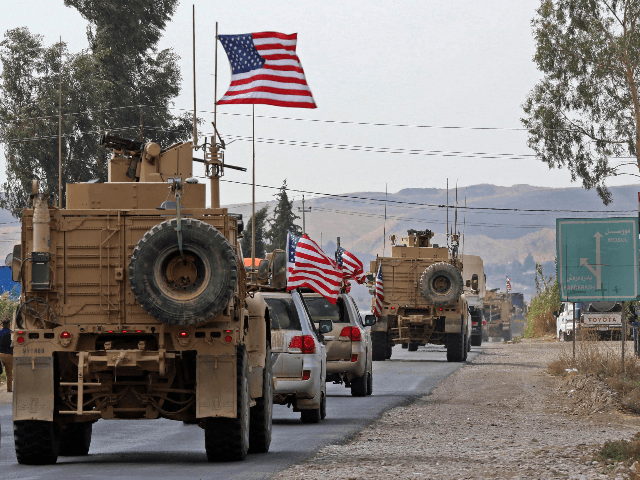A spokesman for a member militia of the Popular Mobilization Forces (PMF), a formal wing of the Iraqi military, warned on Sunday the U.S. would face “appropriate consequences” if it did not fully withdraw from the country in the near future.
The PMF are a coalition of mostly Shiite, Iran-backed militias that rose to prominence during war against the Islamic State “caliphate” in the country. As the Islamic State is a Sunni terrorist organization, the Shiite PMFs played a significant role in fighting against it and denying it geographical control in parts of Iraq where the Kurdish Peshmerga and other forces were not active. The Pentagon credited the PMF with helping ultimately liberate the “caliphate” in 2017.
For their actions, Baghdad formally legalized the PMF as a wing of the Iraqi armed forces in 2018.
While a formal wing of the Iraqi military as an umbrella organization, several PMF groups are U.S.-designated terrorist organizations and have long histories of human rights violations. Following the fall of ISIS, PMF fighters turned on Kurdish and Christian communities in Iraq and escalated threats against the United States.
Sheikh Kadhim al-Fartousi, a spokesman for the PMF group Kataib Sayyid al-Shuhada, told the Kurdish news outlet Rudaw on Sunday the militias did not accept President Joe Biden’s recent declaration that the United States had ended its “combat” mission in the country. Biden’s agreement with Baghdad, revealed in July, would see an end to the presence of American combat troops in Iraq but not of other kinds of military servicemen.
The White House made clear America would continue its ongoing mission against the Islamic State and its “advisory” tasks with the Iraqi government, also adding to confusion as to the real-world implications of Biden’s agreement.
“The talks that took place between Baghdad and Washington, and the outcomes they produced, did not achieve the Iraqi ambition, which is the exit of all U.S. forces,” al-Fartousi told Rudaw. “Changing clothes and appearance is not a withdrawal … the US and foreign forces withdrawal from Iraq has to be in full.”
Al-Fartousi vowed an “appropriate response” to the United States if troops did not leave. Rudaw did not note if he mentioned any deadline with which the PMF wished to see American forces out of the country by.
Kataib Sayyid al-Shuhada, founded initially in Syria as a pro-Bashar al-Assad outfit, has repeatedly threatened to kill American forces. In an interview published with the Associated Press in July, the head of the group, Abu Alaa al-Walae, said the PMF generally were planning “an operation in which everyone says they have taken revenge on the Americans,” al-Walae said at the time. “It will be a qualitative operation (that could come) from the air, the sea, along Iraq’s border, in the region or anywhere. It’s an open war.”
The operation has yet to materialize.
Al-Walae issued the remarks following a decision by the Biden White House to bomb several targets on the Iraq-Syria border tied to Kata’ib Sayyid al-Shuhada (KSS) in June. The strikes targeted another PMF group, the Hezbollah Brigades (KH), which lost its leader Abu Mahdi al-Muhandis to a U.S. airstrike in January 2020. The strike targeted Qassem Soleimani, the leader of the powerful Quds Force of Iran’s Islamic Revolutionary Guard Corps (IRGC), with whom Al-Muhandis was meeting at the time.
The Associated Press noted that al-Walae had hung a portrait of Soleimani in his office.
The June airstrikes triggered an outraged response from Baghdad as well as the PMF leadership in which it decried Biden for a “flagrant violation of Iraqi sovereignty, which is rejected by all international laws and covenants.” Iraq’s Ministry of Defense announced it would study “resorting to all available legal options to prevent the recurrence of such attacks,” but has yet to respond.
American forces have a legal mandate to attack the Islamic State in part because it is a former branch of al-Qaeda, the organization responsible for the attacks on the U.S. homeland on September 11, 2001. Congress gave the president an open-ended Authorization for the Use of Military Force (AUMF) following September 11 that extends to al-Qaeda and all its allies. No similar permissions exist for attacks on the PMF, which not only have no known ties to Sunni jihadist groups but are actively antagonistic towards them.

COMMENTS
Please let us know if you're having issues with commenting.